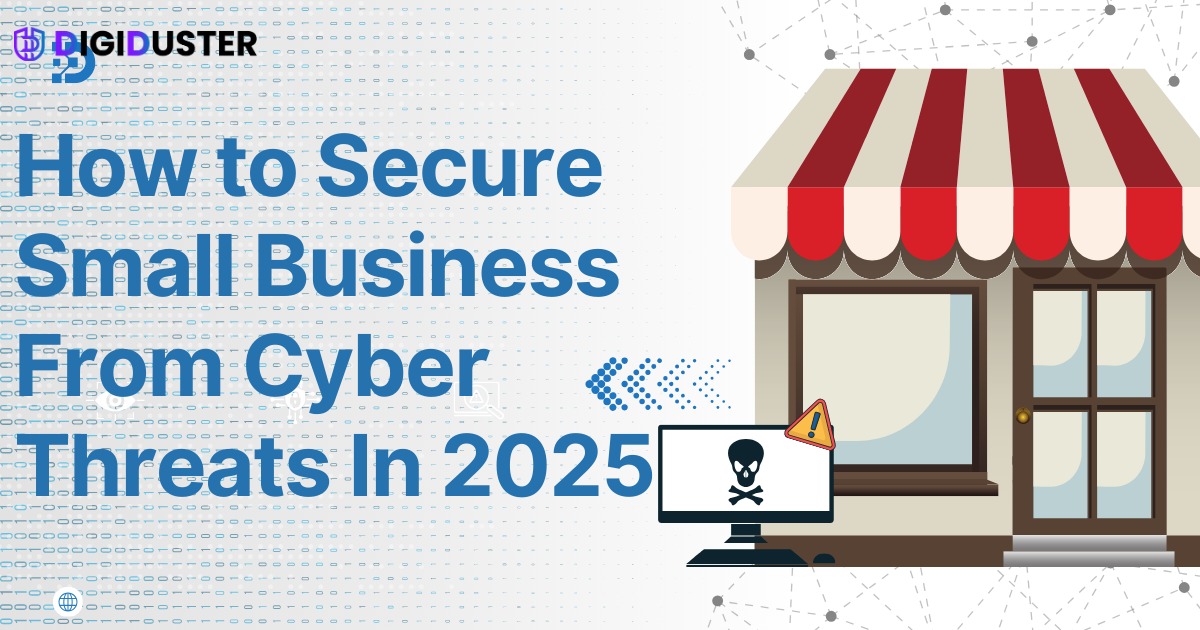Cyberattacks are becoming more frequent and sophisticated in 2025, and small businesses are feeling the heat. According to recent statistics, cybercrime has increased by over 70% in the past year, and small businesses are particularly vulnerable. While big corporations can afford to hire large security teams, many small businesses lack the resources to protect themselves fully. Let’s cover how to secure your small business from Cyber threats.
Small businesses often become targets because they are perceived as “low-hanging fruit.” Cybercriminals know that small businesses may not have the same level of cybersecurity measures as larger organizations, making them an easy target for data breaches, ransomware, and phishing attacks. As a small business owner, protecting your company from these threats should be a priority.
Why Small Businesses Are Targets for Cybercriminals in 2025
One of the main reasons small businesses are targeted is that they typically have fewer resources dedicated to cybersecurity. Large companies have entire teams focused on digital security, while small businesses often lack the budget to invest in similar measures. Cybercriminals know this, making smaller businesses more appealing targets.
Moreover, small businesses often store valuable customer data, such as payment information and personal details. This data is like gold to hackers, who can sell or use it for fraudulent activities. Cybercriminals are also aware that small businesses may not have the right tools in place to monitor their networks effectively, leaving them open to attacks.
The Most Common Cybersecurity Threats for Small Businesses in 2025
Small businesses face various types of cyber threats in 2025. Here are some of the most common:
- Phishing Attacks: These involve emails or messages that appear legitimate but are designed to steal sensitive information like passwords or credit card numbers.
- Ransomware: Hackers lock your data and demand a ransom for its release. This can paralyze your business operations.
- Data Breaches: Cybercriminals access your company’s database and steal customer data, often for financial gain or identity theft.
- Insider Threats: Employees or contractors may intentionally or accidentally expose sensitive information or cause a data breach.
- Distributed Denial of Service (DDoS) Attacks: These attacks overload your server with traffic, causing your website or system to crash.
Understanding these threats will help you put the right strategies in place to protect your business.
Top Cybersecurity Best Practices to Protect Your Small Business in 2025
To protect your small business from cyber threats, there are several best practices you should follow:
- Use Strong Passwords: Always use strong, unique passwords for your accounts. Avoid using easily guessable information like your business name or birthdate.
- Implement Multi-Factor Authentication (MFA): MFA adds an extra layer of protection by requiring more than just a password to access your accounts.
- Keep Software Updated: Regular updates to your operating system, apps, and software help patch security vulnerabilities.
- Encrypt Your Data: Encrypt sensitive information both in storage and during transmission to protect it from unauthorized access.
- Back-Up Your Data Regularly: Backing up your data ensures that you can restore it if an attack occurs.
- Use Antivirus and Anti-malware Software: This software helps detect and remove malicious threats from your devices.
By adopting these best practices, you can significantly improve your business’s cybersecurity posture.
See also: Protect Your Online Privacy With This Essential 10-Point Checklist
The Role of Employee Training in Cybersecurity for Small Businesses
Employees play a crucial role in the security of your business. Many cyberattacks begin with a simple mistake, like clicking on a phishing email link or using a weak password. That’s why employee training is essential.
Train your staff to recognize phishing emails, avoid unsafe websites, and use strong passwords. Conduct regular cybersecurity awareness sessions to ensure everyone understands the risks and knows how to protect your business.
Cybersecurity is a team effort, and well-informed employees are less likely to fall victim to cyberattacks.
How to Use Antivirus and Anti-malware Software to Protect Your Small Business
Antivirus and anti-malware software are essential tools for defending your small business against cyber threats. These programs scan your devices for malicious software, such as viruses, worms, and trojans, and remove them before they can cause harm.
There are many reliable antivirus and anti-malware programs available for small businesses. Some popular options include:
- Norton Antivirus
- McAfee Total Protection
- Bitdefender
- Malwarebytes
Ensure that you choose a program that provides real-time protection, automatic updates, and compatibility with your business’s devices.
How to Secure Your Business’s Data with Encryption and Backups
Encryption is a critical measure to protect sensitive business data. By encrypting your files, you ensure that even if they are stolen, they cannot be accessed without the proper decryption key.
Data backups are just as important. In the event of a ransomware attack or data breach, backups allow you to restore your information without having to pay a ransom. Make sure you back up your data regularly, and store it in a secure location, either on an external hard drive or in the cloud.
Advantages & Disadvantages of Cloud Computing for Small Businesses
The Importance of Network Security for Small Businesses
Network security is a key component of protecting your business. This involves securing your Wi-Fi networks, firewalls, and other devices that connect to the internet.
To secure your network:
- Use Firewalls: Firewalls filter incoming and outgoing traffic, blocking malicious attempts to access your systems.
- Implement a VPN: A Virtual Private Network (VPN) encrypts internet traffic, making it harder for hackers to intercept sensitive data.
- Monitor Your Network: Use intrusion detection systems (IDS) to monitor for any unauthorized activity on your network.
These network security tools will help defend against unauthorized access and reduce the likelihood of cyberattacks.
How to Protect Your Small Business from Ransomware in 2025
Ransomware is one of the most common and damaging cyber threats small businesses face. To protect your business from ransomware, follow these steps:
- Keep Software Updated: Ensure that all software is regularly updated to fix vulnerabilities that hackers can exploit.
- Use Strong Access Controls: Limit employee access to sensitive information based on their role and need-to-know basis.
- Educate Employees: Make sure your employees know how to identify suspicious email attachments and links.
- Regular Backups: Back up your data regularly to ensure that if you are attacked, you can restore your information without paying the ransom.
How Cloud Solutions Can Enhance Cybersecurity for Small Businesses
Cloud services can significantly enhance your business’s cybersecurity. Many cloud providers offer built-in security features, such as encryption, secure access controls, and automatic backups. These features ensure that your data remains safe even if a cyberattack occurs.
Popular cloud services for small businesses include:
- Google Cloud
- Microsoft OneDrive
- Dropbox Business
By storing your data in the cloud, you reduce the risk of losing important files due to cyberattacks or hardware failures.
How to Create a Cybersecurity Incident Response Plan for Your Small Business
Having a plan in place for responding to a cyberattack is crucial. A cybersecurity incident response plan should include the following steps:
- Detection: Identify the attack as soon as possible.
- Containment: Limit the impact of the attack by isolating affected systems.
- Eradication: Remove any malicious software or unauthorized access.
- Recovery: Restore systems and data from backups and ensure everything is secure.
- Post-Incident Review: Analyze the attack to improve future defences.
A clear, well-practised plan ensures that your business can respond effectively to a cyberattack.
The Importance of Regular Software and Security System Updates
Cybersecurity threats are constantly evolving, and the best way to stay protected is by keeping your software up to date. Software updates often include security patches that fix vulnerabilities, making it harder for hackers to exploit your systems.
Make it a habit to check for updates regularly and apply them as soon as possible. This applies to everything from your operating system to your antivirus software.
How to Work with a Cybersecurity Consultant for Your Small Business
If you’re unsure about your business’s cybersecurity, consider consulting with a cybersecurity expert. A professional can help assess your security posture, identify vulnerabilities, and recommend improvements.
Hiring a consultant is especially beneficial for businesses that lack in-house cybersecurity expertise. They can help you create a comprehensive cybersecurity strategy tailored to your specific needs.
Building a Cybersecurity Culture in Your Small Business
Creating a culture of cybersecurity within your organization is essential. This means making cybersecurity a priority at all levels of the business, from leadership to employees.
Develop clear cybersecurity policies, encourage employees to follow best practices, and ensure that everyone understands the importance of protecting your business’s digital assets.
Conclusion: Start Securing Your Small Business Today to Stay Ahead of Cyber Threats
Cybersecurity should be a top priority for small business owners in 2025. By following the tips and best practices outlined above, you can protect your business from the rising tide of cyber threats. Start securing your small business today, and you’ll be in a much better position to defend against cybercriminals in the future.
Stay proactive, stay vigilant, and keep your business secure!



